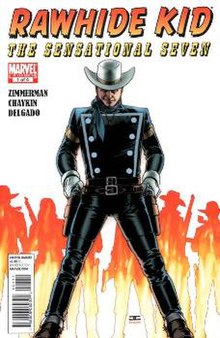Rawhide Kid
| The Rawhide Kid | |
|---|---|

The Rawhide Kid vol. 4, #1 (June 2010)
|
|
| Publication information | |
| Publisher | Atlas Comics / Marvel Comics |
| First appearance | Rawhide Kid #1 (March 1955) |
| Created by |
Stan Lee (writer) Bob Brown (artist) |
| In-story information | |
| Alter ego | Johnny Bart |
| Team affiliations |
Avengers West Coast Avengers The Sensational Seven |
| Notable aliases | Johnny Clay |
| Rawhide Kid | |
| Series publication information | |
| Publisher |
Atlas Comics Marvel Comics |
| Schedule | Bimonthly |
| Format | Ongoing series |
| Genre | Western |
| Publication date |
(Atlas) Mar. 1955 – Sept. 1957 (Marvel) Aug. 1960 – May 1979 |
| Number of issues | 135 |
| Main character(s) | Rawhide Kid |
| Creative team | |
| Writer(s) | Stan Lee, Larry Lieber, Ron Zimmerman |
| Artist(s) | Bob Brown, Larry Lieber |
| Penciller(s) | Jack Kirby |
| Inker(s) | Dick Ayers |
| Collected editions | |
| Marvel Masterworks: Rawhide Kid vol. 1 | |
| Marvel Masterworks: Rawhide Kid vol. 2 | |
The Rawhide Kid (real name: Johnny Bart, originally given as Johnny Clay) is a fictional Old West cowboy appearing in American comic books published by Marvel Comics. A heroic gunfighter of the 19th-century American West who was unjustly wanted as an outlaw, he is one of Marvel's most prolific Western characters. He and other Marvel western heroes have on rare occasions guest-starred through time travel in such contemporary titles as The Avengers and West Coast Avengers. In two mature-audience miniseries, in 2003 and 2010, he is depicted as gay.
The Rawhide Kid debuted in a 16-issue series (March 1955-Sept. 1957) from Marvel's 1950s predecessor, Atlas Comics. Most of the covers from the series were produced by highly acclaimed artists, generally either Joe Maneely or John Severin, but also Russ Heath and Fred Kida. Interior art for the first five issues was by Bob Brown, with Dick Ayers at the reins thereafter.
After a hiatus, the Rawhide Kid was revamped for what was now Marvel Comics by writer Stan Lee, penciler Jack Kirby and inker Ayers. Continuing the Atlas numbering with issue #17 (Aug. 1960), the title now featured a diminutive yet confident, soft-spoken fast gun constantly underestimated by bullying toughs, varmints, owlhoots, polecats, crooked saloon owners and other archetypes squeezed through the prism of Lee & Kirby's anarchic imagination. As in the outsized, exuberantly exaggerated action of the later-to-come World War II series Sgt. Fury and His Howling Commandos, The Rawhide Kid was now a freewheeling romp of energetic, almost slapstick action across cattle ranches, horse troughs, corrals, canyons and swinging chandeliers. Stringently moral, the Kid nevertheless showed a gleeful pride in his shooting and his acrobatic fight skills — never picking arguments but constantly forced to surprise lummoxes far bigger than he.
...
Wikipedia
